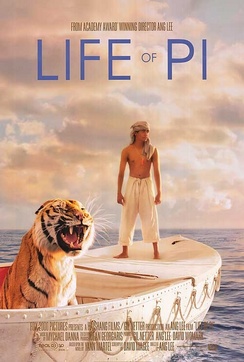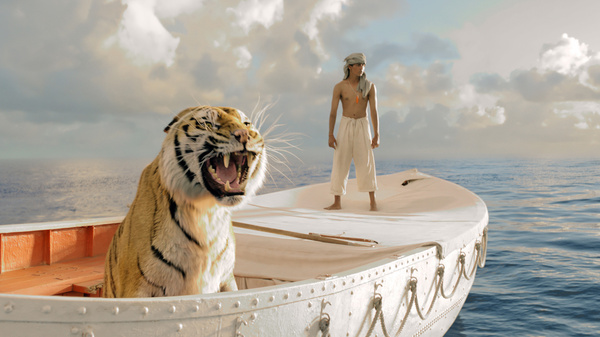Project 52: 'Life of Pi'
Posted Friday, June 7, 2013 at 4:19 PM Central
Last updated Friday, June 7, 2013 at 4:23 PM Central
by John Couture

This concludes the trilogy of films that I was able to watch while on vacation. Life of Pi is a film that, on face value, I was sure that I wouldn't like. Whenever they say that a book is not able to be filmed, they are usually right.
I had not read the book, but both my wife and sister-in-law had and they were both curious as to how the written word would translate onto the big screen. So, I did have a certain wealth of knowledge to draw upon in a manner of speaking.
I will say this about Life of Pi, it's a movie that will make you think and you'll want to start talking about it right away. Unfortunately, I was the last man standing at our condo and I had to wait until the next morning to have meaningful conversations about the film.
One caveat, I know that I laid out a general spoiler warning when I started this little project, but I would be remiss if I didn't at least bring it up again here. It is impossible to review or discuss this film without giving away significant spoilers about the story. So, if you want to remain unspoiled, turn back now and come back after you watch it and we can get into the discussion then.
Life of Pi
The nice thing about having a certain level of apathy to a film is that when you do finally get around to watching it, there's a pretty good chance that you have remained spoiler-free. I didn't even know that there was any sort of twist or surprise ending, if you want to call it that.
The film (and the book for that matter) is much more than simply Cast Away with a tiger standing in for Wilson the volleyball. To be fair, that was the impression that I took into the viewing and I should probably admit that I didn't care too much for Cast Away.
I figured though with Ang Lee at the helm, the film would be breath-taking modern day odyssey and for that reason alone I was intrigued to watch the film. I mean, they couldn't have the kid and the tiger in the boat for the entire 126 minutes, could they?

Thankfully, they didn't. The film is actually a great parable that uses the very mechanics of story, myths and religion to force us into making a choice. It presents a theological study without weighing you down in guilt or judgment. This is very rare these days.
But beyond the religious and moral overtones, it's first and foremost a journey and shining example of the power of the human spirit to persevere through even the most heinous experience imaginable. It is quite literally the Life of Pi.
The film begins at the end as it were with a grown up Pi living in Montreal (I believe, but my facts may be hazy I've slept since then). He is meeting with a reporter who is interested in doing a piece on his life because the reporter has been tipped off that Pi has quite an amazing story to share.
So, right off the bat, we know that the tiger didn't eat Pi, but we are unsure about the fate of the tiger. So there's an immediate sense of duality where we are at least think we know where the story will end up, but we're not completely sure.
Like any good story, Pi starts to recount his life story and we come to realize rather quickly that while being stranded on a life boat at sea was a major part of his life, there are many other things that define him. It's a nice way of reminding the viewer that while the troublesome times in a person's life might be the most memorable and extraordinary, there's more than meets the eye to any good story.
Pi's childhood is almost always a source of turmoil, even before he was born and his parents decided to name him after a swimming pool in Paris, Piscine Molitor. Naturally, the children in his school start to tease him and call him "Pissing Patel." Pi sees this as an opportunity to reinvent himself and takes on the nickname Pi and then goes about learning the mathematical equivalent to pi to a bunch of decimal points.
This is an early demonstration of Pi's ability to adapt to the situation and to persevere until a solution presents itself. Many of these same values echo later in the story when Pi is set adrift.
But the main thrust of his upbringing and the film at large is Pi's quest to simply love God. Being raised Hindu, he starts exploring Christianity and Islam in an attempt to live a better life and to get closer to God. His mother supports his free thinking while his father does not.
This is a theme that plays out over and over again in the film and ultimately, I think it's his free thinking ability that allows Pi to survive. The film doesn't come right out and slap you over the head with this idea, but it's not an incredibly tough stretch either.
The idea of animals are introduced into the story when Pi's father opens a zoo. Pi and the new Bengal tiger Richard Parker have a moment at the zoo that his father turns into a terrible teaching lesson about the pecking order on the food chain. While this also helps to instill some survival skills in Pi that do come in handy later on in the film, I think that this scene ultimately points to the fragility between a life of inspiration and one that is left to be ruled by the animal kingdom without God.
The story starts to pick up when a modern day Noah's Ark is created when Pi's father decides to sell the animals from the zoo to North American buyers and Pi's family hitches a ride across the Pacific Ocean. The cargo ship capsizes for some unknown reason and Pi is left to fend for himself in a rescue boat with an orangutan, a hyena, a zebra with a broken leg and Richard Parker (the tiger).
The hyena makes quick work of the zebra and the orangutan and Richard Parker dispatches the hyena to set up the mano-a-tiger confrontation that is well documented in the trailers. Pi survives 227 days at sea with the Tiger and then the really interesting part takes place.

In rehashing the story with the reporter, Pi then talks about the aftermath of the adventure and when two insurance agents come to talk to him about the fate of their cargo ship. They refuse to believe the fantastical story because it just defies logic, much like Pi's father wanted him to be logical.
So, Pi tells them a different story about the events of the ship sinking without animals. Instead, there's a sailor with a broken leg, the miserable cook, Pi's mother and Pi himself. The cook kills the sailor and turns to cannibalism and then kills Pi's mother. Pi then kills the cook and is forced to turn to cannibalism himself in order to survive. In other words, Richard Parker was the manifestation of himself that Pi uses to allow himself to do these unspeakable acts.
The parallel stories are beautifully rendered by Ang Lee in the myriad of shots in which the sky is reflected by the pristine ocean. These shots also represent heaven and God reflected on Earth if you choose to go with the faith story.
In the end, the film allows the viewer to make up their own mind and choose whatever story they wish. The insurance agents choose the story with the animals simply because it was less messy than the one with murder and cannibalism in it. The writer also chooses the story with the animals because it "is the better story."
Pi responds to him, "thank you and so it goes with God." The story isn't the important part, it's the underlying belief. As humans with free will we can choose to accept the fantastical story of a boy and tiger over the more logical story of cannibalism. It's that faith in a higher power, God, that allows us to do so and that is the point.
It isn't about believing in God, or being right or wrong. It's about having the ability to choose to believe in God, to choose your own story, that's the key to life. In that respect, the film is a huge success and one that I enjoyed thoroughly.
Any film that makes me think and want to talk about it earns high marks from me. For Life of Pi those marks equate a Full House.






